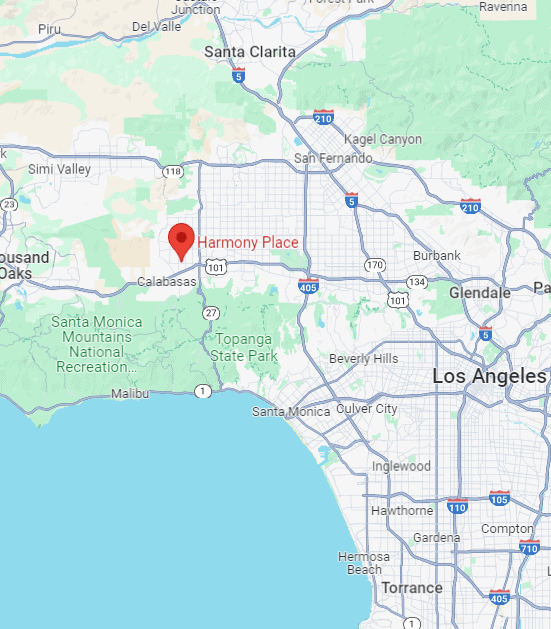Dual Diagnosis Treatment for Trauma and Addiction Rehab in Los Angeles, California
Trauma Disorder and Addiction Treatment in Woodland Hills, Southern California
At Harmony Place Drug and Alcohol Treatment, we understand that overcoming addiction is a profound and personal journey. Our state-of-the-art centers in Los Angeles, California, provide comprehensive rehabilitation programs designed to support individuals battling drug or alcohol dependency, as well as those facing co-occurring emotional trauma. We believe that addressing both addiction and trauma together is essential for lasting recovery, which is why we offer tailored dual-diagnosis care in a safe and compassionate setting. If you’re looking for professional trauma treatment in Los Angeles or trauma rehab in California, Harmony Place is here to guide you every step of the way.
Our approach combines evidence-based therapies with personalized care to ensure your recovery is both effective and sustainable. From trauma counseling in Woodland Hills to residential trauma treatment programs in California, our services are thoughtfully designed to meet your unique needs. Our team specializes in dual-diagnosis treatment, addressing complex trauma and substance use disorders simultaneously through therapies such as cognitive-behavioral therapy (CBT), trauma-focused care, and group support. Whether you require outpatient trauma therapy in Los Angeles or are interested in residential trauma treatment programs, Harmony Place offers a path to healing in a supportive and understanding environment.
We also strive to make access to care as seamless as possible. Harmony Place accepts health insurance, and many plans cover dual-diagnosis trauma rehab. If you’re unsure about coverage, our team can help you verify your insurance and explore additional payment options. Whether you’re seeking trauma therapy at our Woodland Hills clinic or need inpatient treatment for emotional trauma, we are ready to help. Contact us today to learn more about our programs and take the first step toward recovery and emotional wellness. Compassionate care and lasting freedom from addiction and trauma begin here, at Harmony Place.
An Overview of Trauma And Treatment Options in Los Angeles
Traumatic events happen every day around the world, dramatically altering the lives of those involved. Witnessing or being a victim of a violent attack, domestic violence, bullying, and more are all examples of trauma that can stay with a person for years after the initial event.
The thing about traumatic events is that no matter if the event spanned just one hour or several months, even years, any trauma can be debilitating to your physical, emotional, and psychological well-being. This is why seeking trauma-informed care in Los Angeles is important.
Rather than pushing aside your trauma, hoping it will just go away on its own, finding treatment is essential to living a happier, healthier life. At Harmony Place, we are a leading addiction and co-occurring trauma treatment center in Los Angeles that understands just how painful and life-altering traumatic events can be. We offer premier, individualized treatment in a safe and comfortable environment.
Contact us today to learn how our treatment center can help you take back your life.
What Are the Signs of Trauma?
There are a wide variety of events, causes, and situations that can be traumatic. Whether it be a one-time event, such as a mass shooting or violent attack, to ongoing trauma, such as being bullied as a child, these events can stick with you long past the event itself.
While you can try to ignore or dismiss your trauma, this will only make your symptoms worse. If you are unsure if you are experiencing signs of trauma, here are some common signs to look out for.
- Nightmares
- Mood swings
- Intrusive, unexpected thoughts about the event
- Confusion
- Insomnia
- Always being on edge/getting startled easily
- Sexual dysfunction
- Always being alert for potential danger
- Losing interest in hobbies/activities you once found enjoyable
- Social withdrawal
- Avoiding certain places, people, or activities that may be triggering
- Debilitating fear
- Detachment from your emotions and relationships with others
- Depression
- Shame
- Anger
- Anxiety
- Panic attacks
What Are the Long-Term Effects of Trauma?
Long-term trauma, if left untreated, can be debilitating and significantly impact your quality of life. While the long-term effects of trauma may look different depending on your unique experience, common effects of long-term trauma include:
- Substance abuse
- Sexual problems
- Inability to trust others and form healthy, close relationships with friends and family members
- Social withdrawal
- Self-destructive behaviors
- Depression
- Feeling damaged, hopeless, ashamed
While your specific traumatic event will influence the long-term effects experienced by your trauma, there’s no denying that trauma, left untreated, can negatively impact your physical, mental, social, and emotional well-being.

How Does Trauma Impact Mental Health?
Trauma can significantly impact your mental health for the worse and increase your likelihood of developing a mental illness.
This is because when your body experiences a traumatic event, it creates a stress response that triggers your natural fight or flight response. If your trauma involves a singular traumatic event, such as a mass shooting or car accident, this can inevitably trigger your fight or flight response. This response can increase physiological factors like your heart rate as your body’s sign telling you that you’re in danger.
Meanwhile, if you experience ongoing trauma, such as growing up in an unsafe home or neighborhood where violence may have been present, this can trigger your fight or flight response constantly growing up. Thus, your body will become used to always feeling anxious and on edge.
Therefore, trauma can negatively impact your mental health in more ways than one. And, especially if you experienced trauma as a child, you may not realize your unsafe upbringing or traumatic event as a child could be the catalyst for why you feel depressed or anxious as an adult.
Can Traumatic Experiences Cause Drug or Alcohol Addictions?
Research has found that trauma, especially traumatic experiences as a child, can increase your risk of addiction in adulthood leading many to a dual diagnosis, or co-occuring disorders. Because the body endures an overwhelming sense of stress and anxiety from the traumatic event(s), naturally, your body will look for anything to cope with these intense feelings of distress.
This explains why many people who experience trauma may start abusing drugs and alcohol as a way to cope with their trauma symptoms. However, substance abuse only masks or hides the symptoms, and does nothing to treat the source of the trauma, even though your body may feel good at the moment when abusing drugs.
Your body will begin to crave the dopamine hit of the substances you are abusing as it will give your body a false sense of relief from your trauma symptoms. This is where trauma and addiction can easily go hand-in-hand because individuals will become dependent on using a certain substance to calm their mind and body from the constant stress and anxiety they feel living with their untreated trauma symptoms.
Inpatient Trauma and Addiction Treatment
Inpatient trauma and addiction treatment provides a comprehensive, immersive approach for individuals dealing with the dual diagnosis of trauma and substance dependency. At Harmony Place in Woodland Hills, CA, the focus is on creating a healing environment where clients can escape the pressures of daily life and fully engage in their recovery. Trauma, whether stemming from past abuse, grief, or life-altering events, often serves as a catalyst for addiction, as individuals turn to substances like alcohol or drugs to numb the emotional pain. Conversely, substance abuse exacerbates the effects of trauma, creating a vicious cycle that’s hard to break without expert intervention. Harmony Place’s inpatient program offers 24/7 care, combining trauma-focused therapy with addiction treatment to address the interplay between these challenges and support holistic recovery.
Specifically designed for individuals struggling with the compounded effects of trauma and addiction, inpatient treatment at Harmony Place includes a range of evidence-based therapies, such as EMDR (Eye Movement Desensitization and Reprocessing) and cognitive-behavioral therapy (CBT). For those with alcohol addiction, the program incorporates medically supervised detox, individual counseling, and tailored relapse prevention plans to target both physical dependency and the underlying emotional causes. Likewise, clients facing drug addiction are provided with comprehensive care, including medical support, substance-specific education, and coping strategies aimed at sustainable recovery. Nestled in the peaceful community of Woodland Hills, Los Angeles, Harmony Place offers a restorative setting for individuals to focus solely on rebuilding their lives and achieving long-term stability.
Outpatient Trauma and Addiction Treatment
Outpatient trauma and addiction treatment is a tailored approach for individuals facing the challenges of dual diagnosis, where trauma and substance use disorders are interconnected. At Harmony Place in Woodland Hills, CA, outpatient programs offer the flexibility to address these issues while allowing clients to maintain their daily lives and responsibilities. Many people struggling with trauma turn to alcohol or drugs to manage feelings of anxiety, guilt, or hopelessness, which in turn can deepen the cycle of addiction. Outpatient treatment at Harmony Place provides a compassionate, evidence-based structure, enabling clients to process their trauma in a safe space while learning how to manage cravings and triggers related to substance use.
The outpatient program at Harmony Place is designed to meet the individual needs of clients dealing with trauma and either alcohol or drug addiction. For those navigating the challenge of alcohol abuse, the program combines trauma-focused therapy, group support, and relapse prevention strategies to empower long-term recovery. Similarly, individuals battling drug addiction benefit from specialized care, including substance-specific treatment plans, coping skills training, and trauma processing to address the root causes of their struggles. With its location in Woodland Hills—a serene neighborhood in Los Angeles—Harmony Place offers accessibility and a calming backdrop for healing. The focus on personalized and flexible care ensures that clients can pursue recovery at their own pace while staying supported every step of the way.
What Is a Co-Occurring Disorder and Dual Diagnosis?
If you have both a mental health condition and a substance abuse issue simultaneously, this is a dual diagnosis or co-occurring disorder. For example, it’s common for individuals with Post-Traumatic Stress Disorder (PTSD) to also struggle with drug addiction or alcoholism. These conditions interact in ways that can intensify both the trauma symptoms and the addiction.
Dual diagnosis treatment addresses both conditions concurrently, ensuring that the emotional and psychological roots of trauma are treated alongside substance abuse. At Harmony Place, expert clinicians use evidence-based methods like trauma therapy and addiction counseling to help you find healing and regain control over your life.
What Is Co-Occurring Trauma Counseling and Substance Abuse Treatment?
Trauma and substance abuse often go hand in hand. When someone has experienced psychological trauma, they may turn to drugs or alcohol as a way to numb their pain. Unfortunately, using substances can lead to a cycle of addiction that worsens both the trauma and the substance use disorder. Trauma and addiction must be treated simultaneously to break this cycle.
In Los Angeles, Harmony Place Drug and Alcohol Treatment offers specialized care for those suffering from trauma and substance dependence. Their trauma-informed care approach focuses on treating the emotional wounds that drive substance misuse while helping individuals achieve lasting sobriety through comprehensive addiction recovery programs.
Statistics on Trauma and Substance Abuse in Greater Los Angeles
In California, only 10% of individuals diagnosed with substance use disorder (SUD) in the last year received treatment. Amphetamine-related emergency visits rose by nearly 50% between 2018 and 2020, and the fentanyl death rate increased tenfold from 2015 to 2019, highlighting the need for more accessible treatment options.
Recent research has shown promising outcomes for different treatment approaches. For instance, MDMA-assisted therapy has helped 71.2% of participants overcome PTSD symptoms. Additionally, residential drug rehabilitation treatment programs have a 60% success rate for individuals who complete 90 days of planned programs. Moreover, when you struggle with addiction, you receive integrated treatment for both your mental health and substance use disorders, which has been proven to halve hospital stays.
What Is the City of Angels Best Known For?
Los Angeles is famous for its vibrant cultural landmarks and beautiful surroundings. Whether visiting the Hollywood Walk of Fame, exploring the Griffith Observatory, or taking in the views at Santa Monica Pier, LA offers something for everyone. The city is well-known for its excellent rehab facilities, like Harmony Place Rehab Center, which provides essential services in a resource-rich area.
From the busy streets of Beverly Hills to the serene coastline of Santa Monica, LA combines entertainment, innovation, and healing. The city’s wellness hubs, such as Harmony Place Treatment Center, provide a haven for those seeking concurrent treatment for substance abuse and trauma.

We Will Verify Your Insurance for Rehab
Can Drug and Alcohol Addiction Cause Trauma Disorders?
Drug addiction and alcoholism can lead to psychological trauma. If you struggle with substance use disorder, you might face traumatic events like violence, abuse, or severe health problems due to your addiction. These experiences can leave emotional scars. It’s crucial to tackle both the root cause of substance abuse and the ensuing trauma response.
At Harmony Place Treatment Center, we understand the complex relationship between addiction and trauma. By offering trauma-informed care, we treat the underlying emotional pain of the trauma impact while helping you break free from the cycle of substance misuse. Healing from both conditions is possible with the proper support. Contact us if you have more questions, such as, “Can addiction cause trauma?”
Can Trauma Lead to Addiction and Substance Abuse Disorders?
Trauma is one of the leading causes of substance abuse. Many people use drugs or alcohol abuse to cope with painful memories and trauma triggers, but this can quickly spiral into substance dependence. Unresolved emotional trauma, particularly from events like childhood trauma or significant loss, often contributes to the development of addiction.
By addressing both trauma and substance use disorders at the same time, Harmony Place Addiction Recovery helps you build resilience and find healthier ways to cope. Our holistic approach to concurrent treatment for substance use and trauma ensures that you’re not just treating the symptoms but also the emotional wounds that may be fueling your addiction.
Signs and Symptoms of Developing Substance Abuse and Trauma
When dealing with both substance abuse and trauma, the signs and symptoms can often overlap. Recognizing symptoms early allows you to seek the right treatment and start on the path to healing from trauma. Keep an eye out for these common signs.
Common Signs and Symptoms of Trauma Disorder
Trauma can affect you in many ways. In some cases, symptoms might present themselves immediately or emerge months or even years later. Recognizing the signs early is critical to preventing further emotional and mental health complications, and it can help you begin your journey toward trauma recovery.
You might experience intrusive thoughts, flashbacks, or nightmares related to your triggering trauma. For example, you may avoid going places, seeing people, or engaging in activities that remind you of the trauma, which can make daily life feel overwhelming or even unmanageable. You may also feel constantly on edge, always worried about potential threats, even in situations where you should feel safe.
Common Signs and Symptoms of Drug and Alcohol Addiction
Addiction can slowly take over your life in ways you might not even realize at first. Recognizing the symptoms early on is essential to getting the help you need. Here are some of the most common signs of substance abuse you should watch for:
- Cravings for the Substance: You may find yourself constantly thinking about using drugs or alcohol, with these cravings controlling your thoughts and actions.
- Tolerance (Needing More to Achieve the Same Effect): Over time, you might need to use more substance to get the same high or relief you used to experience with smaller amounts.
- Withdrawal Symptoms: When you’re not using the substance, you could experience anxiety, nausea, or physical symptoms like shaking or sweating.
- Neglecting Responsibilities: You may start missing essential obligations, like work, school, or family events, as a result of your substance use.
- Loss of Control Over Substance Use: You might find it difficult or impossible to control how often or how much you use, even if you want to stop.
- Continued Use Despite Negative Consequences: Even if your health, relationships, or finances are suffering, you may continue to use drugs or alcohol.
- Social Isolation: You could begin withdrawing from family, friends, and social activities because your substance use takes priority.
- Physical Health Issues: You might notice a decline in your physical health, like significant weight changes, liver problems, or frequent illnesses.
- Mood Swings: Your emotions may swing dramatically between euphoria when using and irritability or depression when you’re not.
What Are the Co-occurring Risks of Substance Addiction and Trauma?
When you experience both substance addiction and trauma, the risks can compound, making recovery more challenging and the consequences more severe. Without addressing both issues simultaneously, you may face various mental, physical, and social problems. Here are some of the most common risks associated with co-occurring trauma and substance abuse:
- Increased Risk of Overdose: Using substances to cope with emotional trauma can lead to frequent or heavier use, increasing the chances of a life-threatening overdose.
- Worsening Mental Health (Depression, Anxiety): Untreated trauma often intensifies feelings of depression and anxiety, which makes it more challenging to break free from the cycle of addiction.
- Higher Risk of Suicide: The combination of addiction and trauma can lead to feelings of hopelessness and despair, increasing the likelihood of suicidal thoughts or actions.
- Severe Physical Health Decline: Substance abuse over time may cause serious health problems and even damage vital organs such as your liver and heart.
- Strained Relationships and Social Isolation: Trauma and addiction may affect your relationships, leading to social isolation and loneliness.
- Impaired Cognitive Function: The long-term effects of substance use can impair your ability to think, make decisions, and solve problems, all of which are crucial for recovery.
- Difficulty Maintaining Employment: Struggling with addiction and trauma can make it hard to hold down a job, resulting in instability in both your personal and professional life.
- Aggressive or Risky Behavior: The emotional volatility caused by trauma and substance abuse may lead you to engage in dangerous or aggressive actions, putting yourself and others at risk.

Concurrent Trauma and Substance Addiction Treatment Program Facilities in Los Angeles, CA
At Harmony Place, we recognize that both complex trauma and addiction require comprehensive, personalized care. Our concurrent treatment for trauma and substance abuse program in Los Angeles is designed to address both conditions at once, ensuring that neither goes untreated. Using evidence-based therapies, we help you heal from past wounds while guiding you toward a healthier future.
If you or a loved one is dealing with substance abuse and trauma, call us at (855) 652-9048 to learn how our dedicated team can support your trauma recovery journey. At our Woodland Hills locations, you will find both inpatient and outpatient services where you can work on healing through personalized care.
Outpatient Trauma and Addiction Rehab Facility Near Me
If you’re searching for an outpatient trauma and addiction rehab facility “near me,” Valley Restoration Center in Woodland Hills provides a supportive and flexible environment for recovery. Conveniently located at 22900 Ventura Blvd., our facility is dedicated to helping clients tackle the intertwined challenges of trauma and substance dependency. Trauma, whether from personal loss, abuse, or life-changing events, can deeply affect mental health, often leading to self-medication through alcohol or drug use. At Valley Restoration Center, our outpatient programs are crafted to help clients process traumatic experiences while equipping them with new coping strategies to overcome addiction. By combining trauma-focused therapy with addiction recovery tools, we offer a comprehensive approach that empowers individuals to regain control over their lives.
At Valley Restoration Center, we prioritize making recovery accessible while respecting the unique needs of our clients. Our outpatient programs include trauma counseling, group therapy sessions, and relapse prevention strategies, tailored to work around the demands of your daily life. This flexible model allows individuals to attend therapy while continuing with work, school, or family responsibilities. Additionally, our program addresses both alcohol and drug addiction through specialized therapies, guiding clients toward sustainable recovery while unraveling the root causes of trauma. We also accept a range of health insurance plans, ensuring financial concerns don’t stand in the way of quality care. Our compassionate team is here to assist with insurance verification and to design a program that meets your recovery goals.
Getting to Valley Restoration Center is easy for residents in Woodland Hills and the greater Los Angeles area. Located on Ventura Blvd., the center is just minutes away from the Ventura Freeway (US-101), offering convenient access for clients commuting by car. For those using public transit, nearby bus stops make it equally accessible. The warm and welcoming surroundings of the center, nestled in the vibrant Woodland Hills community, create an environment of calm and encouragement. If you’re searching for an outpatient rehab facility “near me” equipped to address trauma and addiction, Valley Restoration Center is here to guide you on your path to healing and wellness.
Inpatient Trauma and Addiction Rehab Facility Near Me
If you are in search of an inpatient trauma and addiction rehab facility “near me,” Harmony Place in Woodland Hills offers a safe haven for individuals seeking comprehensive and immersive care. With locations at 23041 Hatteras St. and Harmony Place East at 22913 Burbank Blvd., Harmony Place provides 24/7 support and a structured environment where healing and recovery can begin. Trauma often drives individuals toward addictive behaviors as a way to cope, while addiction can intensify the effects of unresolved trauma. Harmony Place’s inpatient programs are specifically designed to address this dual diagnosis, offering trauma-focused therapies such as EMDR and cognitive-behavioral therapy alongside individualized addiction treatment. By integrating mental health support with addiction recovery, these programs provide clients with the tools to break free from the cycle of trauma and dependency.
Harmony Place prioritizes personalized care, tailoring each treatment plan to the unique needs of their clients. For those dealing with trauma and alcohol addiction, the inpatient program includes supervised detox, one-on-one counseling, and skills-based therapies to ensure safety and long-term success. Individuals battling trauma and drug addiction receive equally comprehensive support, with medical care, substance-specific education, and relapse prevention strategies forming the backbone of their recovery. Clients benefit from living in a stable, distraction-free environment, fostering a sense of safety and focus that is vital for addressing the root causes of trauma and addiction. Through a combination of expert care and a holistic approach, Harmony Place empowers clients to rebuild their lives and envision a brighter future without the burden of trauma or addiction.
Situated in the tranquil Woodland Hills community, both Harmony Place locations are easily accessible for residents of Los Angeles and the surrounding areas. Located just a short distance from the Ventura Freeway (US-101), the facilities provide convenient access for visitors traveling by car. Public transportation options are available nearby, making the centers easy to reach for those relying on buses or other methods of transit. The serene atmosphere of the Woodland Hills neighborhood enhances the recovery experience, with tree-lined streets and a peaceful environment that allows clients to focus entirely on their healing. If you’re looking for trusted inpatient rehab facilities “near me,” Harmony Place offers a compassionate and effective path toward recovery, guided by an experienced team ready to support you every step of the way.
Does Insurance Cover Dual Diagnosis Treatment for Addiction and Trauma Therapy in Los Angeles, CA?
Yes, most commercial health insurance plans do cover addiction and trauma therapy in Los Angeles County. Many insurance providers recognize the importance of treating both conditions together, especially in cases where you need dual diagnosis treatment for trauma and substance abuse. However, insurance coverage may vary because of both your policy and the treatment center.
At Harmony Place Treatment Center, we work with most major insurance providers to ensure you get the care you need for trauma and substance abuse treatment in Los Angeles. We encourage you to reach out for a free insurance verification to understand your specific coverage options for dual diagnosis treatment, individual trauma therapy, substance abuse therapy, and substance abuse counseling.
How Much Does Dual Diagnosis Treatment Cost for Substance Addiction and Trauma Counseling in Los Angeles, CA?
The cost of dual diagnosis treatment for addiction and trauma treatment in Greater Los Angeles can vary widely based on the type of program you choose. Inpatient programs tend to cost more because they require round-the-clock care and residential accommodations, while outpatient programs can offer a more affordable option without sacrificing quality of care.
At Harmony Place Rehab Center, we provide personalized treatment that fits your needs and budget. While the costs of treatment can depend on the length of stay and services provided, many insurance policies cover a portion of these expenses. Contact us to discuss specific pricing and your insurance coverage options.
How to Get into Recovery Rehab for Trauma Disorder and Addiction Treatment in Los Angeles, CA
If you or a loved one is struggling with trauma and substance addiction, the first step is reaching out for help. Harmony Place offers a seamless admissions process, beginning with an insurance verification to understand your coverage. From there, our team will work with you to build a treatment plan that addresses both your trauma and substance abuse.
Don’t wait to start your healing journey. You can reach us by calling (855) 652-9048 or filling out the online form for insurance verification. Our team is here to guide you and ensure you receive the care and support you need for lasting recovery while you learn trauma-coping strategies.
- Inpatient Rehab Los Angeles
- Intensive Outpatient Program Los Angeles
- Evening Intensive Outpatient Program
- Medication Assisted Treatment Los Angeles
- Outpatient Rehab Program Los Angeles
- Los Angeles Partial Hospitalization Program
- Medically Assisted Detox LA
- Sober Living Homes and Halfway Houses
- Clinical Care Los Angeles
- Family Therapy Rehab Program
- Couples Rehab Los Angeles
- Men’s Addiction Rehab California
- Women’s Rehab Center SoCal
- Addiction Treatment for Veterans
- Short-Term Addiction Rehab
- Long-Term Addiction Rehab
- Private Luxury Rehab Los Angeles
- Faith-Based Rehab Programs
- Non-Faith-Based Rehab
- Rehab for Professionals LA
- Rehab Aftercare Alumni Programs
California Addiction Treatment and Trauma Statistics and Information
- In California, only about 10% of individuals diagnosed with a Substance Use Disorder in the last year received treatment. The number of amphetamine-related emergency department visits increased by nearly 50% between 2018 and 2020, which reflects the growing need for more accessible treatment options, according to the Substance Abuse and Mental Health Services Administration (SAMHSA).
- The death rate from fentanyl in California increased 10-fold from 2015 to 2019, while prescription opioid addiction deaths dropped by 30% during that same period, according to the California Health Care Foundation (CHCF).
- 71.2% of participants receiving MDMA-assisted therapy no longer met the diagnostic criteria for PTSD following treatment, compared to 47.6% in the placebo group, according to a study conducted by the University of California, San Francisco.
- Success rates for residential drug treatment programs in the U.S. are around 60% for people who stay in treatment for at least 90 days or complete shorter, planned programs, according to AddictionGroup.org.
- When mental health and substance use disorders are treated together, it has a success rate of 50% in reducing hospitalizations and improving overall stability for patients, according to research published in the Journal of Clinical Medicine.
Request a 100% Confidential Callback
What Is Trauma-Informed Care?
Trauma-informed care focuses not on “what may be wrong with you” but “what happened to you.” While it may be challenging to talk to and relive your trauma to your support staff, it’s essential for your support team to understand what you went through to devise a comprehensive care plan to better treat your trauma.
The trauma-informed care approach draws on six main principles:
Safety
Trustworthiness and transparency
Peer Support
Collaboration and mutuality
Empowerment, voice, and choice
Cultural, historical, and gender issues
A primary symptom of trauma is that individuals cannot form trusting, healthy, open relationships with anyone. This can make it difficult for treatment staff to provide the best possible care to the individual without the ability to open up about what happened and what they may be going through.
Creating a safe, caring, inclusive environment for each patient is essential to taking a trauma-informed care approach. This way, the patient can open up to the provider about what happened so the provider can work with the individual to create a treatment plan for their trauma symptoms.
Harmony Place offers trauma treatment in Los Angeles, so every patient always feels safe and comfortable at our center, while getting the care they need to take back their life.




